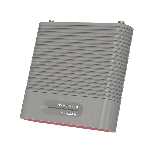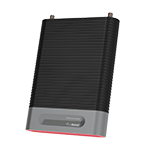Does Weather Affect Cell Phone Signal? | Wilson Amplifiers
Have you ever noticed your cell phone signal acting differently during bad weather conditions?
Many people question if weather affects cell phone signal. The answer is yes.
Behind the scenes, cell phones and cellular towers use radio waves to communicate with each other. Through these waves, your phone can access the internet, send and receive text messages, post pictures on social media, and talk to friends and family.
For optimal signal, there must be a clear line of sight between your cell phone and the nearest cell tower. Unfortunately, that’s not always possible. Physical obstructions (mountains, hills, forests, ridges, building material, tall buildings, etc.) and weather phenomena (rain, snow, humidity, etc.) can reflect, refract, or completely block the radio signal.
We fix poor cell phone signal! Find the right signal booster for you:




How Does Weather Affect Cell Signal?
Weather can directly or indirectly interfere with your cell phone signal.
Direct interference is caused by weather conditions that directly alter the radio waves path; it’s either reflected, refracted, or blocked. For example, heavy rain causes the waves to bounce around as the signal attempts to travel through the water droplets.
Indirect interference is caused by uncontrollable obstacles that weaken, block, and sometimes completely terminate the signal. For example, if lightning damages a cell tower, the users receiving their signal from that tower will lose their cell phone reception.
How Does Atmospheric Water Vapor Affect Cell Signal?
Water (humidity, clouds, fog, snow, and rain) in the atmosphere is the main weather-related culprit that affects your cell reception. The ions and impurities in water make it a great conductor of electricity, which interferes with cellular signals. Since water conducts electricity, it allows water vapor in the air to reflect, refract, and absorb energy from the sound waves to convert them into heat (also known as the propagation delay effect).
As a result, cell phone signal takes longer to travel between your phone and the cell towers, causing dropped calls, slow data, spotty signal.
Water vapor coupled with different weather conditions affects your cell phone signal differently:
Rain – Thunderstorms and rainstorms are the most likely to interfere with your cell phone signal because of the amount of water vapor associated with them. The amount of rain and the size of the water droplets will determine the impact they will have on the cell service.
In addition, thunderstorms are coupled with lightning. The lightning bolts can cause electrical interference and damage antennas, power lines, and cell towers.
Snow and Hail – These weather conditions are composed of ice, which is less dense and reflective than rain. They are less likely to directly interfere with your signal. However, heavy snow might cause signal interference.
Snow and hail are more likely to indirectly interfere with your cell phone signal; they could damage cell phone towers or cause power outages.
Fog and Clouds – These weather conditions are composed of water vapor, which reflects and refracts radio waves, causing weak signal. They tend to only impact certain radio frequencies (measured in MHz). Devices operating below 2,000 MHz will not see a drastic change in their signal, but anything above can be impacted. Visit our cellular frequency guide to see which frequencies US carriers use.
In some instances, people experience better cell phone signal when it's foggy. The right quantity of water vapor can help signal transmissions, but too much of it causes signal issues.
How does Wind Affect Cell Phone Signal?
Wind on its own will not directly interfere with your signal. But, high winds can indirectly interfere with your mobile phone's signal. It can damage antennas, cell phone towers, and any electrical equipment associate with them, causing you to lose service.
When wind is paired with severe weather phenomena, it can directly and indirectly affect your cell phone reception.
How Does Temperature Affect Cell Phone Signal?
There is no evidence suggesting that hot and cold temperatures affect cell signal. However, some people experience signal issues when the temperature drops or increases.
The culprit is not the temperature, it’s the humidity in the air.
When it’s hot and humid, there is a lot of water vapor in the air. As mention earlier the water vapor can reflect, refract, and absorb the signal's energy, potentially causing your signal to be less than satisfactory.
On the other hand, extremely cold weather, or extremely hot weather, causes water vapor to freeze or evaporate. Remember, some moister in the air helps signal travel. During these extreme temperatures, the right quantity of moister is not present to help the signal travel to and from the cell phone towers. But, the lack of water vapor won’t drastically affect your cellular reception.
How to Improve Weather-Related Signal Issues?
Now that you know how weather affects cell phone signal, you might be wondering what the best solution is to mitigate the effects of weather-related interferences.
Best cellular signal boosters (also known as signal amplifiers) can help improve weak signal in your home, vehicle, or office building caused by different atmospheric conditions. They take your existing outside signal and boost it to improve your internet speeds, phone call quality, signal strength, and cell coverage. If your signal drops from three bars to one bad during a heavy rainstorm, using a signal booster will boost your signal (LTE, 4G, and 5G) and improve the communication between the cell tower and your phone.

Best for mid-size homes with strong outside signal or small home with weak outside signal
Buy Now For $569.99
Best for large homes with strong outside signal or midsize home with weak outside signal.
Buy Now for $999.99The great thing about mobile signal boosters is that they will work with any cellular device (iPhone, Android, tablets, hotspots, etc.), with any major U.S carrier (Verizon, AT&T, T-Mobile, and US Cellular), and they don't need a WiFi connection.
Contact Us
Wilson Amplifiers is a leading provider of cell phone signal amplifiers, devices that amplify 4G & 3G LTE for any phone with any carrier for home, office, or car. We’ve boosted over 10,000,000 sq ft of signal for homes, buildings, and vehicles across America and Canada.
- Free consultation (ask us anything) with our US-based customer support. Email: (sales@wilsonamplifiers.com). Phone: 1-800-568-2723.
- Free shipping. Usually ships same day.
- 90-day (seriously) money back guarantee. You want to make sure you're satisfied.
Our goal is simple: keep people connected. Ask us anything and we'll be glad to help.
Interested in Learning More? Check Out Our Signal Boosting Info Center


Money Back Guarantee

Technical Support